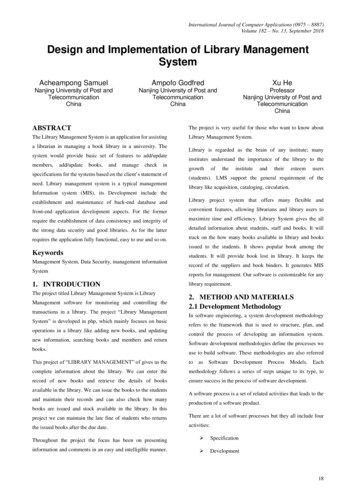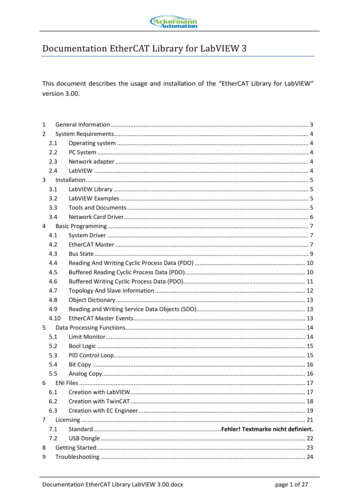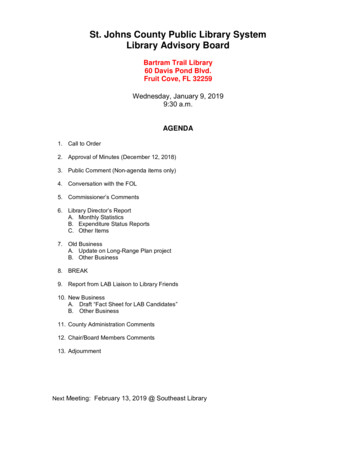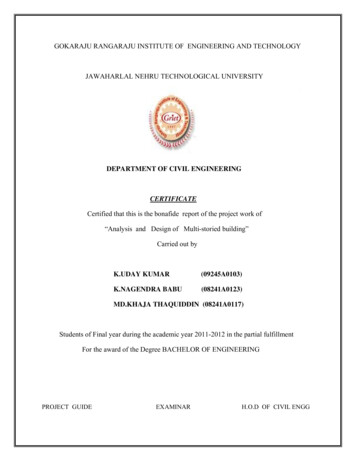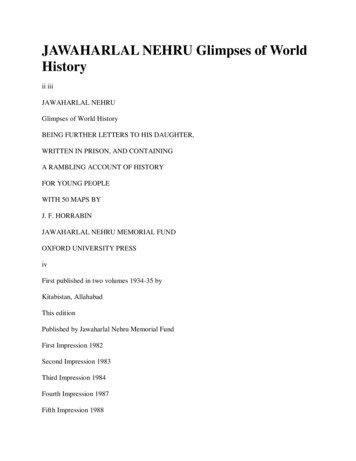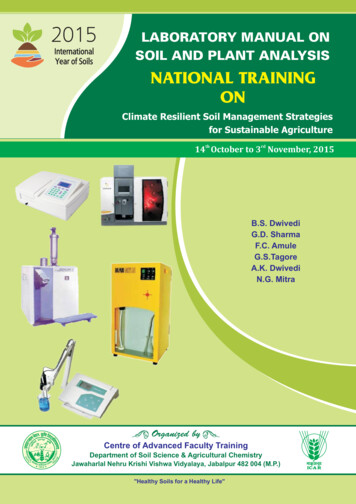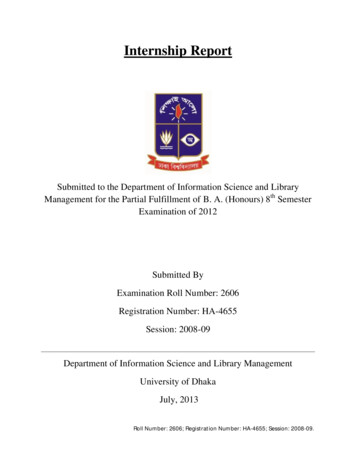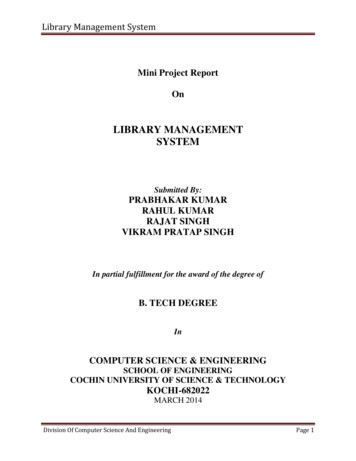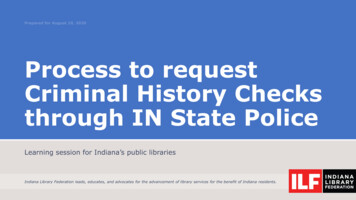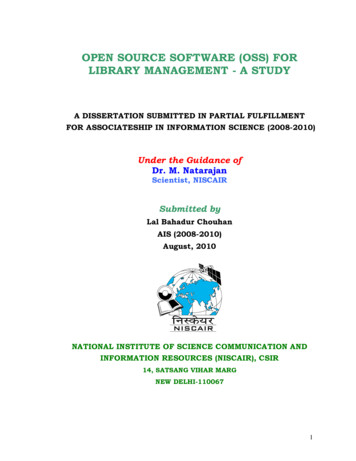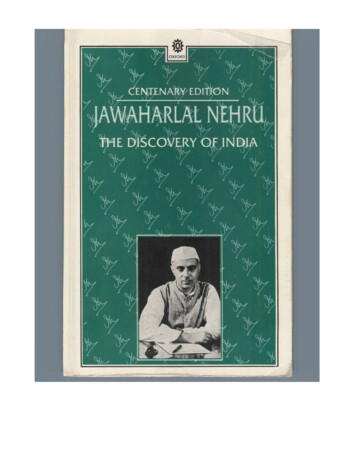
Transcription
JAWAHARLALNEHRUThe Discovery of India
JAWAHARLALNEHRUThe Discovery of IndiaDELHIOXFORD UNIVERSITY PRESSOXFORDNEW YORK
UCKLANDCAPE BOMBAYISTANBULMADRASMEXICO CITYOxfordDAR ES SALAAMHONG KONGKUALA LUMPURStreet,NEW YORKTOKYODELHIKARACHIMELBOURNESINGAPORETORONTOand associates inBERLIN IBADAN Rajiv Gandhi 1985First published 1946 byThe Signet Press, CalcuttaCentenary Edition 1989Sixth impression 1994Printed at Rekha Printers Pvt. Ltd., New Delhi 110020and published by Neil O'Brien, Oxford University PressYMCA Library Building, Jai Singh Road, New Delhi 110001
To my colleagues and co-prisoners inthe A h m a d n a g a r Fort Prison C a m pfrom 9 August 1942 to 28 March 1945
FOREWORDMy father's three books — Glimpses of World History, AnAutobiograpy and The Discovery of India — have been mycompanions through life. It is difficult to be detached aboutthem.Indeed Glimpses was' written for me. It remains t h e bestintroduction to the story of man for young and growing peoplein India and all over the world. The Autobiography has beenacclaimed as not merely the quest of one individual for freedom, b u t as an insight into the making of the mind of newIndia. I h a d to correct the proofs of Discovery while my fatherwas away, I think in Calcutta, and I was in Allahabad ill withmumps! The Discovery delves deep into the sources- of India'snational personality. Together, these books have moulded awhole generation of Indians and inspired persons from m a n yother countries.Books fascinated Jawaharlal Nehru. He sought out ideas.He was extraordinarily sensitive to literary beauty. In hiswritings he aimed at describing his motives a n d appraisals asmeticulously as possible. T h e purpose was not self-justificationor rationalization, b u t to show the Tightness and inevitabilityof the actions and events in which he was a prime participant.He was a luminous man and his writings reflected the radianceof his spirit.T h e decision of the Jawaharlal N e h r u Memorial F u n d tobring out a uniform edition of these three classics will bewidely welcomed.Indira G a n d h iNewDelhi4 November 1980
PREFACEThis book was written by me in A h m a d n a g a r F o r t prison d u r i n gthe five months, April to S e p t e m b e r 1944. Some of my colleaguesin prison were good enough to read the manuscript a n d makea n u m b e r of valuable suggestions. On revising t h e book in prisonI took advantage of these suggestions and m a d e some additions.No one, I need hardly add, is responsible for w h a t I havewritten or necessarily agrees with it. But I must express my deepgratitude to my fellow-prisoners in A h m a d n a g a r F o r t for thei n n u m e r a b l e talks a n d discussions we h a d , which h e l p e d megreatly to clear my o w n mind a b o u t various aspects of Indianhistory a n d culture. Prison is not a pleasant place to live in evenfor a short period, m u c h less for long years. But it was a privilegefor me to live in close contact with m e n of o u t s t a n d i n g abilityand culture a n d a w i d e h u m a n outlook which even t h e passionsof the m o m e n t did n o t obscure.My eleven companions in A h m a d n a g a r F o r t w e r e an interestingcross-section of I n d i a a n d represented in their several ways notonly politics b u t Indian scholarship, old a n d new, a n d variousaspects of present-day India. Nearly all t h e principal livingI n d i a n languages, as well as the classical languages which havepowerfully influenced I n d i a in the past a n d present, wererepresented a n d t h e s t a n d a r d was often t h a t of high scholarship.A m o n g t h e classical languages w e r e Sanskrit and Pali, Arabica n d Persian; t h e m o d e r n languages w e r e Hindi, U r d u , Bengali,Gujarati, Marathi, Telugu, Sindhi a n d Oriya. I h a d all this wealthto d r a w u p o n a n d the only limitation was my own capacity toprofit by it. T h o u g h I am grateful to all my companions, I shouldlike to mention especially M a u l a n a Abul Kalam Azad, whosevast erudition invariably delighted me b u t sometimes also rathero v e r w h e l m e d me, Govind Ballabh Pant, N a r e n d r a D e v a a n dM. Asaf Ali.It is a year a n d a q u a r t e r since I finished writing this booka n d some parts of it are already somewhat out of date, and m u c hhas h a p p e n e d since I wrote it. I h a v e felt t e m p t e d to add and
10JAWAHARLAL NEHRUrevise, but I have resisted t h e temptation. Indeed I could nothave done otherwise for life outside prison is of a differenttexture and there is no leisure for thought or writing. It has beendifficult enough for me to read again what I have written. Iwrote originally in long-hand; this was typed after my release.I was unable to find time to read the typescript a n d thepublication of the book was being delayed when my daughter,Indira, came to my rescue and took this burden off my shoulders.The book remains as written in prison with no additions orchanges, except for the postscript at the end.I do not know how other authors feel about their writings,but always I have a strange sensation when I read somethingthat I h a d written some time previously. T h a t sensation isheightened when the writing h a d been done in the close andabnormal atmosphere of prison and the subsequent reading hastaken place outside. I recognize it of course, but not wholly;it seems almost that I was reading some familiar piece writtenby another, who was near to me and yet who was different.Perhaps that is the measure of the change that has taken placein me.So I have felt about this book also. It is mine and not whollymine, as I am constituted today; it represents rather some pastself of mine which has already joined that long succession dfother selves that existed for a while and f a d e d away, leavingonly a memory behind.Jawaharlal NehruAnandBhawan, Allahabad29 December 1945
CONTENTSForewordPrefaceCHAPTER ONE: AHMADNAGAR FORTTwenty MonthsFamineThe War for DemocracyTime in Prison: The Urge to ActionThe Past in Its Relation to the PresentLife's PhilosophyThe flurden of the Past7915161820222433CHAPTER TWO: BADENWEILER, LAUSANNEKamalaOur Marriage and AfterThe Problem of Human RelationshipsChristmas 1935DeathMussolini Return394043444546CHAPTER THREE: THE QUESTThe Panorama of India's PastNationalism and InternationalismIndia's Strength and WeaknessThe Search for India'Bharat Mata'The Variety and Unity of IndiaTravelling through IndiaGeneral ElectionsThe Culture of the MassesTwo Lives49525357596163646768CHAPTER FOUR: THE DISCOVERY OF INDIAThe Indus Valley CivilizationThe Coming of the AryansWhat is Hinduism?The Earliest Record, Scripture and MythologyThe VedasThe Acceptance and the Negation of LifeSynthesis and Adjustment. The Beginnings of the Caste SystemThe Continuity of Indian CultureThe Upanishads6972747679808487
12JAWAHARLAL NEHRUThe Advantages and Disadvantages of an IndividualisticPhilosophyMaterialismThe Epics. History, Tradition, and MythThe Mahabharata.The Bhagavad GitaLife and Work in Ancient IndiaMahavira and Buddha: CasteChandragupta and Chanakya. The Maurya Empire EstablishedThe Organization of the StateBuddha's TeachingThe Buddha R FIVE: THROUGH THE AGESNationalism and Imperialism under the GuptasSouth IndiaPeaceful Development and Methods of WarfareIndia's Urge to FreedomProgress versus SecurityIndia and IranIndia and GreeceThe Old Indian TheatreVitality and Persistence of SanskritBuddhist PhilosophyEffect of Buddhism on HinduismHow did Hinduism Absorb Buddhism in India?The Indian Philosophical ApproachThe Six Systems of PhilosophyIndia and ChinaIndian Colonies and Culture in South-East AsiaThe Influence of Indian Art AbroadOld Indian ArtIndia's Foreign TradeMathematics in Ancient IndiaGrowth and 200207210214216221CHAPTER SIX: NEW PROBLEMSThe Arabs and the Mongols.The Flowering of Arab Culture and Contacts with IndiaMahmud of Ghazni and the AfghansThe Indo-Afghans. South India. Vijayanagar. Babar.Sea PowerSynthesis and Growth of Mixed Culture. Purdah. Kabir.Guru Nanak. Amir KhusrauThe Indian Social Structure. Importance of the GroupVillage Self-Government. The Shukra Nitisara22723123423724
CONTENTSThe Theory and Practice of Caste. The Joint FamilyBabar and Akbar: The Process of IndianizationThe Contrast between Asia and Europe in MechanicalAdvance and Creative EnergyDevelopment of a Common CultureAurangzeb Puts the Clock Back. Growth of Hindu Nationalism.ShivajiThe Marathas and the British Struggle for Supremacy.Triumph of the BritishThe Backwardness of India and the Superiority of the Englishin Organization and TechniqueRanjit Singh and Jai SinghThe Economic Background of India: The Two Englands13250257260265270273276281284CHAPTER SEVEN: THE LAST PHASE (1): CONSOLIDATIONOF BRITISH RULE AND RISE OF NATIONALIST MOVEMENTThe Ideology of Empire. The New CasteThe Plunder of Bengal Helps the Industrial Revolutionin EnglandThe Destruction of India's Industry and the Decay ofher AgricultureIndia Becomes for the First Time a Political and EconomicAppendage of Another CountryThe Growth of the Indian States SystemContradictions of British Rule in India. Ram Mohan Roy.The Press. Sir William Jones. English Education in BengalThe Great Revolt of 1857. RacialismThe Techniques of British Rule: Balance and CounterpoiseGrowth of Industry: Provincial DifferencesReform and Other Movements among Hindus and MoslemsKemal Pasha. Nationalism in Asia. IqbalHeavy Industry Begins. Tilak and Gokhale. 50352CHAPTER EIGHT: THE LAST PHASE ( 2 ) : NATIONALISMVERSUS IMPERIALISMHelplessness of the Middle Classes. Gandhi ComesThe Congress Becomes a Dynamic Organization underGandhi's LeadershipCongress Governments in the ProvincesIndian Dynamism versus British Conservatism in IndiaThe Question of Minorities. The Moslem League: Mr M.A. JinnahThe National Planning CommitteeThe Congress and Industry: Big Industry versus Cottage IndustryGovernment Checks Industrial Growth. War Production isDiversion from Normal Production356360365371380395402409
14JAWAHARLAL NEHRUCHAPTER NINE: THE LAST PHASE (3): WORLD WAR IIThe Congress Develops a Foreign PolicyThe Congress Approach to WarReaction to WarAnother Congress Offer and Its Rejection by the BritishGovernment. Mr Winston ChurchillIndividual Civil DisobedienceAfter Pearl Harbour. Gandhi and Non-ViolenceTensionSir Stafford Cripps Comes to IndiaFrustrationThe Challenge: Quit India Resolution416422426432439442449453464468CHAPTER TEN: AHMADNAGAR FORT AGAINThe Chain of HappeningThe Two Backgrounds: Indian and BritishMass Upheavals and Their SuppressionReactions AbroadReactions in IndiaIndia's Sickness: FamineIndia's Dynamic CapacityIndia's Growth ArrestedReligion, Philosophy, and ScienceThe Importance of the National Idea. Changes Necessaryin IndiaIndia: Partition or Strong National State or Centre ofSupra-National State?Realism and Geopolitics. World Conquest or WorldAssociation. The U.S.A. and the U.S.S.R.Freedom and EmpireThe Problem of Population. Falling Birth-rates andNational DecayThe Modern Approach to an Old 6548551557POSTSCRIPTAllahabad 29th December 1945567Index569
C H A P T E RONEAHMADNAGARFORTTwenty MonthsA h m a d n a g a r Fort, 13th April 1944IT IS MORE THAN TWENTY MONTHS SINCE WE W E R E BROUGHT H E R E ,more than twenty months of my ninth term of imprisonment.T h e new moon, a shimmering crescent in the darkening sky,greeted us on our arrival here. T h e bright fortnight of the waxingmoon h a d begun. Ever since then each coming of the new moonhas been a reminder to me that another m o n t h of my imprisonment is over. So it was with my last term of imprisonment whichbegan with the new moon, just after the Deepavali, the festival oflight. T h e moon, ever a companion to me in prison, has grownmore friendly with closer acquaintance, a reminder of the loveliness of this world, of the waxing and waning of life, of lightfollowing darkness, of death and resurrection following each otherin interminable succession. Ever changing, yet ever the same, Ihave watched it in its different phases and its many moods in theevening, as the shadows lengthen, in the still hours of the night,a n d when the breath a n d whisper of dawn bring promise of thecoming day. H o w helpful is the moon in counting the days a n d themonths, for the size a n d shape of the moon, when it is visible,indicate the day of the m o n t h with a fair measure of exactitude.It is an easy calendar (though it must be adjusted from time totime), and for the peasant in the field the most-convenient one toindicate the passage of the days and the gradual changing of theseasons.Three weeks we spent here cut off completely from all newsof the outside world. T h e r e were no contacts of any kind, nointerviews, no letters, no newspapers, no radio. Even our presencehere was supposed to be a state secret unknown to any except tothe officials in charge of us, a poor secret, for all I n d i a knew wherewe were.T h e n newspapers were allowed and, some weeks later, lettersfrom near relatives dealing with domestic affairs. But no
interviews during these 20 months, no other contacts.T h e newspapers contained heavily censored news. Yet theygave us some idea of the war that was consuming more than halfthe world, and of how it fared with our people in India. Littlewe knew about these people of ours except that scores of thousands lay in prison or internment camp without trial, that thousands h a d been shot to death, that tens of thousands h a d beendriven out of schools and colleges, that something indistinguishable from martial law prevailed over the whole country, that terrora n d frightfulness darkened the land. T h e y were worse off, farworse than us, those scores of thousands in prison, like us, withouttrial, for there were not only no interviews but also no letters ornewspapers for them, and even books were seldom allowed. M a n ysickened for lack of healthy food, some of our dear ones died forlack of proper care a n d treatment.T h e r e were m a n y thousands of prisoners of war kept in India,mostly from Italy. We compared their lot with the lot of our ownpeople. We were told that they were governed by the GenevaConvention. But there was no convention or law or rule to governthe conditions under which I n d i a n prisoners a n d detenus had toexist, except such ordinances which it pleased our British rulers toissue from time to time.FamineFamine came, ghastly, staggering, horrible beyond words. InM a l a b a r , in Bijapur, in Orissa, and, above all, in the rich a n dfertile province of Bengal, men and women and little childrendied in their thousands daily for lack of food. T h e y dropped downdead before the palaces of Calcutta, their corpses lay in the m u d huts of Bengal's innumerable villages and covered the roads andfields of its rural areas. M e n were dying all over the world a n dkilling each other in battle; usually a quick death, often a bravedeath, death for a cause, death with a purpose, death whichseemed in this mad world of ours an inexorable logic of events,a sudden end to the life we could not mould or control. Deathwas common enough everywhere.But here death had no purpose, no logic, no necessity; it wasthe result of man's incompetence and callousness, m a n - m a d e , aslow creeping thing of horror with nothing to redeem it, lifemerging and fading into death, with death looking out of theshrunken eyes a n d withered frame while life still lingered for awhile. And so it was not considered right or proper to mentionit; it was not good form to talk or write of unsavoury topics. Todo so was to 'dramatize' an unfortunate situation. False reports16
were issued by those in authority in India and in England. Butcorpses cannot easily be overlooked; they come in the way.While the fires of hell were consuming the people of Bengaland elsewhere, we were first told by high authority that owingto wartime prosperity the peasantry in m a n y parts of India hadtoo much to eat. T h e n it was said that the fault lay with provincial autonomy, a n d that the British Government in India, orthe India Office in London, sticklers for constitutional propriety,could not interfere with provincial affairs. T h a t constitution wassuspended, violated, ignored, or changed daily by hundreds ofdecrees and ordinances issued by the Viceroy under his sole a n dunlimited authority. T h a t constitution meant ultimately theunchecked authoritarian rule of a single individual who wasresponsible to no one in India, a n d who had greater power t h a nany dictator anywhere in the world. T h a t constitution was workedby the p e r m a n e n t services, chiefly the I n d i a n Civil Service andthe police, who were mainly responsible to the Governor, whowas the agent of the Viceroy, and who could well ignore theministers when such existed. T h e ministers, good or b a d , lived onsufferance and dared not disobey the orders from above or eveninterfere with the discretion of the services supposed to be subordinate to them.Something was done at last. Some relief was given. But a millionhad died, or two millions, or three; no one knows how m a n ystarved to death or died of disease during those months of horror.No one knows of the m a n y more millions of emaciated boys a n dgirls a n d little children who just escaped death then, but arestunted and broken in body a n d spirit. And still the fear of widespread famine a n d disease hovers over the land.President Roosevelt's Four Freedoms. T h e Freedom fromW a n t . Yet rich England, a n d richer America, paid little heedto the hunger of the body that was killing millions in India, asthey h a d paid little heed to the fiery thirst of the spirit that isconsuming the people of India. Money was not needed it wassaid, a n d ships to carry food were scarce owing to war-timerequirements. But in spite of governmental obstruction a n d desireto minimize the overwhelming tragedy of Bengal, sensitive andwarm-hearted m e n a n d women in England a n d America andelsewhere came to our help. Above all, the Governments ofChina a n d Eire, poor in their own resources, full of their owndifficulties, yet having h a d bitter experience themselves of faminea n d misery a n d sensing what ailed the body and spirit of India,gave generous help. I n d i a has a long memory, b u t whatever elseshe remembers or forgets, she will not forget these gracious andfriendly acts.17
The War for D e m o c r a c yIn Asia a n d Europe and Africa, and over the vast stretches ofthe Pacific and Atlantic and Indian Oceans, war has raged in allits dreadful aspects. Nearly seven years of war in China, overfour and a half years of war in Europe and Africa, and two yearsa n d four months of World W a r . W a r against fascism and nazismand attempts to gain world dominion. Of these years of war Ihave so far spent nearly three years in prison, here and elsewherein India.I remember how I reacted to fascism and nazism in their earlydays, and not I only, but m a n y in India. H o w Japanese agression in China had moved India deeply and revived the age-oldfriendship for China; how Italy's rape of Abyssinia had sickenedus; how the betrayal of Czechoslovakia had hurt and embitteredus; how the fall of Republican Spain, after a struggle full of heroicendurance, had been a tragedy and a personal sorrow for me andothers.It was not merely the physical acts of aggression in whichfascism a n d nazism indulged, not only the vulgarity and brutality that accompanied them, terrible as they were, that affectedus, but the principles on which they stood and which they proclaimed so loudly and blatantly, the theories of life on whichthey tried to fashion themselves; for these went counter to whatwe believed in the present, a n d what we had held from ages past.And even if our racial memory had forsaken us and we had lostour moorings, our own experiences, even though they came tous in different garb, and somewhat disguised for the sake of decency,were enough to teach us to what these nazi principles and theories of life a n d the state ultimately led. For our people had beenthe victims for long of those very principles and methods of government. So we reacted immediately and intensely against fascismand nazism.I remember how I refused a pressing invitation from SignorMussolini to see him in the early days of March, 1936. M a n y ofBritain's leading statesmen, who spoke harshly of the fascist Ducein later years when Italy became a belligerent, referred to himtenderly and admiringly in those days, and praised his regimeand methods.T w o years later, in the summer before Munich, I was invitedon behalf of the Nazi government, to visit Germany, an invitation to which was added the remark that they knew my opposition to nazism a n d yet they wanted me to see G e r m a n y for myself. I could go as their guest or privately, in my own n a m e orincognito, as I desired, and I would have perfect freedom to go18
where I liked. Again I declined with thanks. Instead I went toCzechoslovakia, that 'far-away country' about which England'sthen Prime Minister knew so little.Before M u n i c h I met some of the members of the British Cabinet and other prominent politicians of England, a n d venturedto express my anti-fascist and anti-nazi views before them. Ifound that my views were not welcomed and I was told that therewere m a n y other considerations to be borne in mind.During the Czechoslovak crisis, what I saw of Franco-Britishstatesmanship in Prague and in the Sudetenland, in Londona n d Paris, a n d in Geneva where the League Assembly was thensitting, amazed a n d disgusted me. Appeasement seemed to be afeeble word for it. T h e r e was behind it not only a fear of Hitler,but a sneaking admiration for him.And now, it is a curious turn of fate's wheel that I, a n d peoplelike me, should spend our days in prison while w a r againstfascism a n d nazism is raging, and m a n y of those who used tobow to Hitler and Mussolini, and approve of Japanese aggression in China, should hold aloft the b a n n e r of freedom anddemocracy a n d anti-fascism.In India the change is equally remarkable. T h e r e are thosehere, as elsewhere, 'governmentarians', who hover r o u n d theskirts of government and echo the views which they think willbe approved by those whose favour they continually seek.There was a time, not so long ago, when they praised Hitlerand Mussolini, a n d held them up as models, and when theycursed the Soviet Union with bell, book, a n d candle. Not sonow, for the weather has changed. T h e y are high governmentand state officials, a n d loudly they proclaim their anti-fascismand anti-nazism a n d even talk of democracy, though with batedbreath, as something desirable but distant. I often wonder w h a tthey would have done if events h a d taken a different turn, a n dyet there is little reason for conjecture, for they would welcomewith garlands and addresses of welcome whoever happened towield authority.For long years before the war my mind was full of the war t h a twas coming. I thought of it, a n d spoke of it, and wrote a b o u tit, and prepared myself mentally for it. I wanted I n d i a to takean eager a n d active part in the mighty conflict, for I felt thathigh principles would be at stake, and out of this conflict wouldcome great and revolutionary changes in India and the world. Atthat time I did not envisage an immediate threat to I n d i a : anyprobability of actual invasion. Yet I wanted India to take herfull share. But I was convinced that only as a free country andan equal could she function in this way.19
T h a t was the attitude of the National Congress, the one greatorganization in India which consistently for all these years h a dbeen anti-fascist and anti-nazi, as it h a d been anti-imperialist.It had stood for Republican Spain, for Czechoslovakia, andthroughout for China.And now for nearly two years the Congress has been declaredillegal—outlawed and prevented from functioning in any way.T h e Congress is in prison. Its elected members of the provincial parliaments, its speakers of these parliaments, its ex-ministers, its mayors and presidents of municipal corporations, arein prison.Meanwhile the war goes on for democracy and the AtlanticCharter and the Four Freedoms.T i m e in Prison : The Urge to ActionT i m e seems to change its nature in prison. T h e present hardlyexists, for there is an absence of feeling a n d sensation whichmight separate it from the dead past. Even news of the active,living a n d dying world outside has a certain dream-like unreality, an immobility and an unchangeableness as of the past.T h e outer objective time ceases to be, the inner a n d subjectivesense remains, but at a lower level, except when thought pullsit out of the present and experiences a kind of reality in the pastor in the future. We live, as Auguste Comte said, dead men'slives, encased in our pasts, but this is especially so in prisonwhere we try to find some sustenance for our starved a n d lockedup emotions in memory of the past or fancies of the f u t u r e .T h e r e is a stillness a n d everlastingness about the past; itchanges not and has a touch of eternity, like a painted pictureor a statue in bronze or marble. Unaffected by the storms andupheavals of the present, it maintains its dignity and repose a n dtempts the troubled spirit a n d the tortured mind to seek shelterin its vaulted catacombs. There is peace there and security, andone m a y even sense a spiritual quality.But it is not life, unless we can find the vital links between ita n d the present with all its conflicts a n d problems. It is a kindof art for art's sake, without the passion a n d the urge to actionwhich are the very stuff of life. Without that passion and urge,there is a gradual oozing out of hope a n d vitality, a settling downon lower levels of existence, a slow merging into non-existence.We become prisoners of the past and some p a r t of its immobilitysticks to us.This passage of the mind is all the easier in prison where action20
is denied and we become slaves to the routine of jail-life.Yet the past is ever with us and all that we are a n d that wehave comes from the past. We are its products a n d we live immersed in it. Not to understand it and feel it as something livingwithin us is not to understand the present. To combine it withthe present a n d extend it to the future, to break from it where itcannot be so united, to make of all this the pulsating a n d vibrating material for thought and action—that is life.Any vital action springs from the depths of the being. All thelong past of the individual and even of the race has preparedthe background for that psychological moment of action. Allthe racial memories, influences of heredity and environmentand training, subconscious urges, thoughts a n d dreams a n dactions from infancy and childhood onwards, in their curiousand tremendous mix-up, inevitably drive to that new action,which again becomes yet another factor influencing the future.Influencing the future, partly determining it, possibly even largelydetermining it, a n d yet, surely, it is not all determinism.Aurobindo Ghose writes somewhere of the present as ' t h e purea n d virgin m o m e n t , ' that razor's edge of time a n d existence whichdivides the past from the future, a n d is, and yet, instantaneouslyis not. T h e phrase is attractive and yet what does it m e a n ?T h e virgin m o m e n t emerging from the veil of the future in allits naked purity, coming into contact with us, and immediatelybecoming the soiled a n d stale past. Is it we that soil it a n d violateit? Or is the m o m e n t not so virgin after all, for it is bound upwith all the harlotry of the past?W h e t h e r there is any such thing as h u m a n freedom in thephilosophic sense or whether there is only an automatic determinism, I do not know. A very great deal appears certainly tobe determined by the past complex of events which bear downa n d often overwhelm the individual. Possibly even the innerurge that he experiences, that apparent exercise of free will, isitself conditioned. As Schopenhauer says, 'a m a n can do whathe will, but not will as he will.' A belief in an absolute determinism seems to me to lead inevitably to complete inaction, todeath in life. All my sense of life rebels against it, though ofcourse that very rebellion m a y itself have been conditioned byprevious events.I do not usually b u r d e n my mind with such philosophical ormetaphysical problems, which escape solution. Sometimes theycome to me almost unawares in the long silences of prison, oreven in the midst of an intensity of action, bringing with thema sense of detachment or consolation in the face of some painfulexperience. But usually it is action and the thought of action21
vhat fill me, and when action is denied, I imagine that I ampreparing for action.T h e call of action has long been witn m e ; not action divorcedfrom thought, but rather flowing from it in one continuoussequence. And when, rarely, there has been full h a r m o n y between the two, thought leading to action a n d finding its fulfilment in it, action leading back to thought a n d a fuller understanding—then I have sensed a certain fullness of life and a vividintensity in that moment of existence. But such moments are rare,very rare, and usually one outstrips the other a n d there is a lackof h a r m o n y , and vain effort to bring the two in line. T h e r e wasa time, m a n y years ago, when I lived for considerable periodsin a state of emotional exaltation, wrapped up in the actionwhich abso
Books fascinate Jawaharlad Nehru Hl soughe. ou ideastt . He wa extraordinarils sensitiv to literar y e beauty Iyn hi .s writings he aime ad describint hi motivesg ans appraisald as s meticulously as possible Th. purpose wae nos self-justificatiot n or rational

